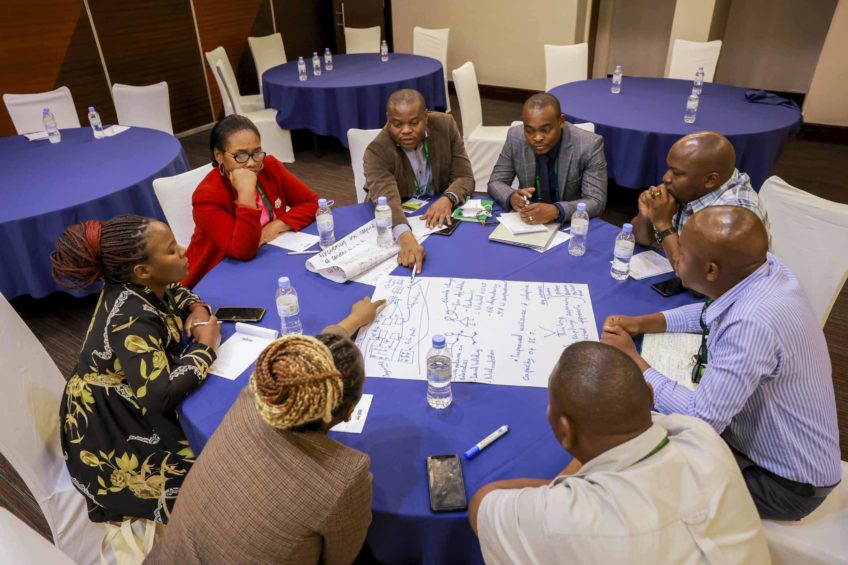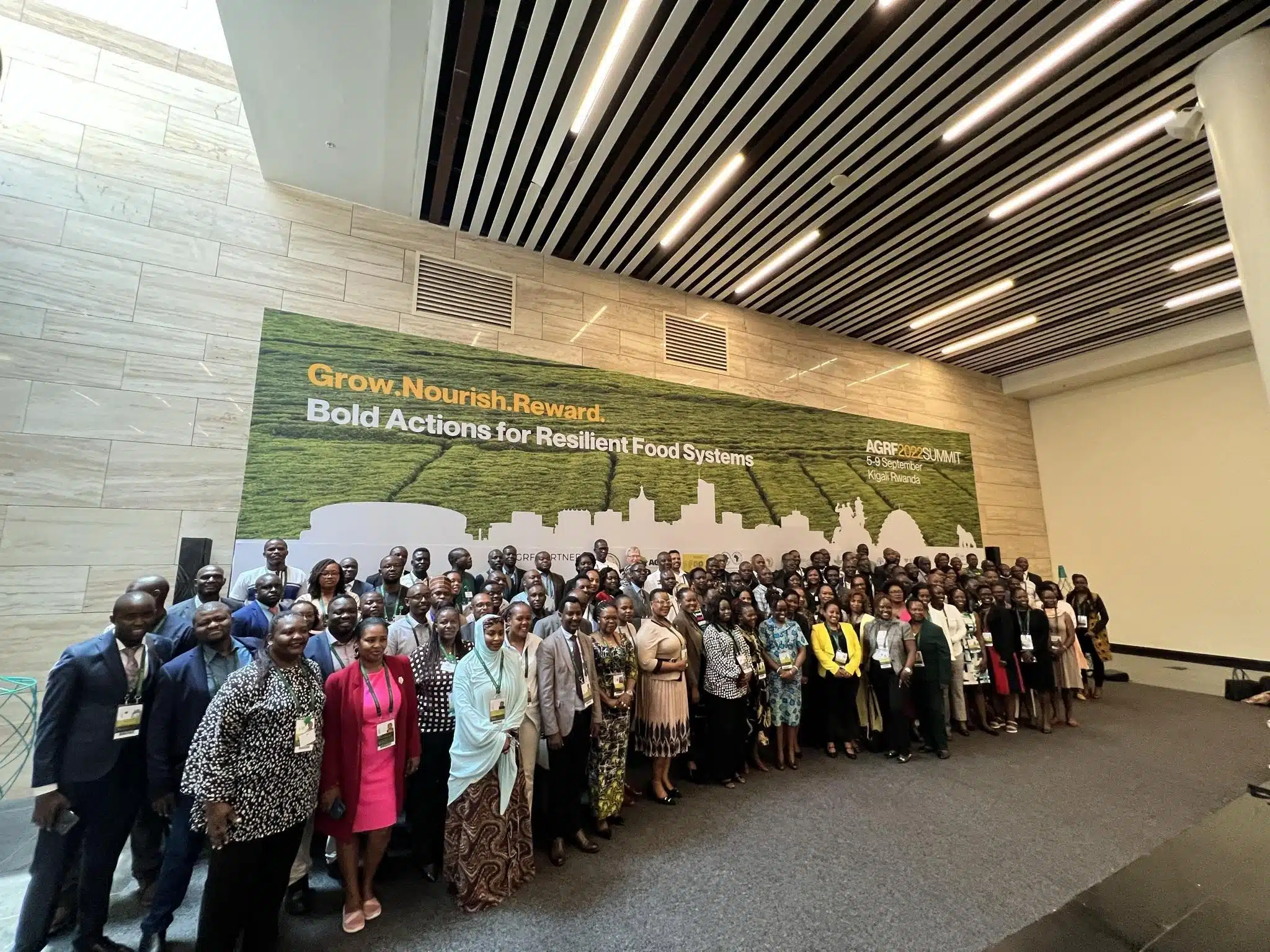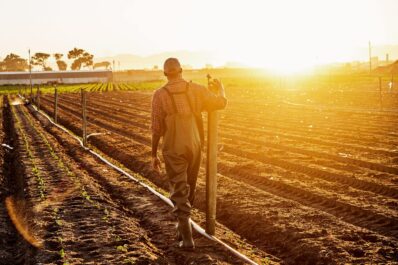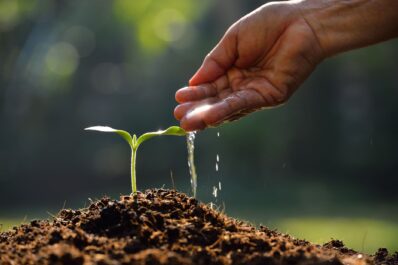Collaborative leadership; an action-based response to climate change’s impact on Africa’s food systems
28th November 2022 by CALA

Africa’s food systems hang in the balance as the effects of climate change disrupt agriculture across the continent. The Horn of Africa alone is facing its worst drought in 40 years with over 36.1 million people affected. The food systems crisis is not going unattended however, with various African-led responses underway. For Africa’s food systems to remain resilient, longer-term investments are required. This includes the Centre for African Leaders in Agriculture (CALA), a nascent initiative led by AGRA to invest in and prepare food systems leaders to engage in immediate action-based learning and collaborative problem-solving.
This approach was on display this past September as nearly 8,500 delegates and high-level officials involved in Africa’s agriculture sector prepared to arrive in Kigali for the 2022 AGRF Summit. Two days before the Summit, over 150 individuals from eight countries had already rolled up their sleeves at CALA’s 3rd Leadership Forum, titled: Collaborative Leadership: Advancing African Food Systems.
“We are in the midst of a food systems crisis. A crisis in terms of climate. A crisis in terms of food availability,” pointed out Iddi Zakaria, a member of CALA’s second cohort in Ghana. He serves as the Deputy Director, Agriculture, Agribusiness, and Agro-processing, North Development Authority of Ghana. “CALA is unique by identifying and bringing up leadership in Africa that matter in decision making, and for us to be able to enhance our capacity to make [key] decisions.”
Held in the lead-up to the annual AGRF, CALA’s Leadership Forum in Kigali was the first in-person forum since the Centre’s launch in 2021 due to Covid restrictions. CALA delegates collaborated and learned together in their role as leaders in government, civil society, and the private sector, each with a key role in their country’s national agriculture priorities.
“Building bridges in the agriculture system is what CALA is about,” said Dr. Agnes Kalibata, AGRA’s president in her opening remarks. An AGRA-led initiative, CALA is supported and implemented by the African Management Institute (AMI) and USAID’s Policy Link. “Building strength and going beyond borders, understanding we are stronger together, I really hope we get to build the bonds between the public sector and private sector,” continued Kalibata.
A crucial component in CALA’s 16-month Advanced Leadership Programme learning journey, the Leadership Forums are designed to complement other key elements from the programme by providing a space for peer-to-peer networking with cohorts across the continent and learning from sector experts. The aim is to drive collaborative and delivery-enhanced leadership, advance country-level policies and programmes as well as enhance leadership skills in environmental sustainability through exposure to agroecological principles, climate change adaptation, and environmental and social management (ESMS). Some of the key components of the programme were; virtual and in-person learning sessions, Action Learning Projects (ALPs), on-the-job and in-country coaching, peer accountability activities, Game-Changing case studies, and peer-to-peer networking with cohorts from across the continent.
“All we’ve been doing concerning food systems before now has been in silos, leaders, and operators of food systems in Africa especially, work in their own space, “ said Grace Obi-Ukpabi from Nigeria who is a member of CALA’s Cohort 1 and head of the Division of Agriculture, Water Resources and Gender Sector for Nigeria’s Ministry of Finance Budget and National Planning. “From what I’ve learned, we can only succeed in the food system space if we work as a team, then the food system can be a reality.”
Over the two days of the Leadership Forum, CALA’s practical and experiential learning model leveraged the fact that two cohorts from each of the programme’s eight focus countries would be together for the first time. The agenda included solution-based conversations with keynote speakers which set the stage for two days of panel discussions from the participants themselves, group sessions with agri-experts, country roundtable discussions, and hands-on workshops where delegates hashed out ideas and shared feedback on their Action Learning Projects.
Unique to CALA and the African Management Institute’s action learning methodology, the Action Learning Projects are programme-long projects that are tackled by cross-cutting teams. Cohorts are divided up into small 5-person country teams, most of whom have never worked together before, and are now tasked to take on and solve a specific food systems problem of their choice.
“We centered the learning experience at this first in-person Leadership Forum on these ALPs to drive in-person collaboration and learning across all 8 country cohorts,” said Brenda Wandera, Programme Lead, AMI. “As a result, national leaders in different sectors had the chance to interact in person and learn how to lead and collaborate to implement their national agricultural priorities, while also building on the collaborative leadership skills they are learning in the programme.”

Over 150 members from 8 countries, representing two cohorts from CALA’s Advanced Leadership programme gather for a group photo at the 2022 AGRF in Kigali, Rwanda held in September.
Many of the CALA participants have focused their ALPs on pragmatic projects to advance climate-resilient food systems in their country, a top priority for many countries.
“In Ghana, for instance, we recently completed a project that equipped farmers with the knowledge to plant along the contours, ensuring that we do not deplete the soil through rampant cropping and the loss of soil nutrients,” said Cynthia Asare Bediako, Ghana’s Chief Director in the Ministry of Environment speaking to the media outlet Ethiopia’s New Business Ethiopia.
“Team Sustainability Ghana” one of the groups that presented their ALP, is focusing on addressing the challenge of decreasing soil fertility and the impact of climate change on smallholder farmers in the northern Savannah region of Ghana. The team comprising of 5 professionals drawn from various backgrounds combined their experience and expertise to address food sustainability through nature-based solutions and a circular economy approach to food systems.
With Africa being the most vulnerable to the impacts of climate change, the urgency with which its effects on the food system are dealt with is critical. CALA’s programme is helping 160 leaders in 8 countries learn how navigate and collaborate on not just local issues, but regional challenges and solutions. With nearly 20 action learning projects slated to be underway and implemented by CALA delegates by 2023, Africa’s food systems leaders will not only be learning what works to improve their own leadership skills, but also what is required to get things done on the ground, together.
“Now we have a holistic picture of what is going on in Africa, from Ghana to Malawi, we have the image and picture of the future of agriculture, what other people are doing, the challenges and possible solutions,” said Mutako Vedasto Alphonsine, a member of Rwanda’s inaugural CALA cohort.
Related posts

AGRA Announces Open of CALA’s Advanced Leadership Programme Fourth Cohort Applications
15th May 2024
AGRA has announced the opening of applications for the third cohort of the Centre for African Leaders in Agriculture (CALA)’s Advanced Leadership Programme, designed for rising stars(upcoming technical leaders) and established executives from across Africa’s agriculture sector in government, the private sector, and civil society.
The Advanced Leadership programme is the continent’s premier leadership programme, tailored to support developing leaders in advancing agriculture transformation across the continent through the improved capacity to lead the implementation of country agriculture flagship programmes and national agriculture priority programmes.

Alumni Spotlight: Leading the Charge for Sustainable Agriculture in Africa
24th October 2023
“Knowledge empowers leaders. It’s the catalyst for change,” says Peter Juma Lugendo, an alumnus of the Centre for African Leaders in Agriculture (CALA) and the President and Chief Operating Officer at Kickstart. Peter’s journey through agriculture is a testament to what can be achieved when visionary leaders are armed with knowledge and driven by a profound purpose.
Through his training, Peter gained a deeper understanding of collaborative leadership and the art of setting SMART goals. These newfound skills supported his goal to create a nurturing environment at Kickstart, where team members thrive and perform effectively.

Alumni Spotlight: Promoting Sustainable Food Systems in Uganda- A World Food Day Special Edition
16th October 2023
In the Pearl of Africa, a determined alumna of the Centre for African Leaders in Agriculture (CALA), Rachel Ajambo, is on a mission to revolutionize food systems and combat global hunger. As the world is celebrating World Food Day with the theme “Water is life, water is food. Leave no one behind,” Rachel’s story serves as a testament to the power of education, collaboration, and commitment.
Rachel’s journey with CALA broadened her perspective on value chain development and food system transformation. With newfound knowledge, she delved into the complexities of managing water for production, a topic deeply connected to this year’s World Food Day theme.
The Centre for African Leaders in Agriculture (CALA) is made possible with the friendly support of:

